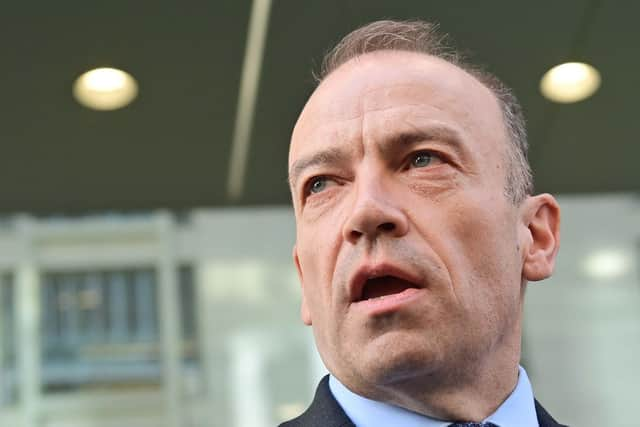Budget for Northern Ireland expected to contain major cuts to public services
and live on Freeview channel 276
Northern Ireland Secretary Chris Heaton-Harris, who has responsibility for setting the Stormont budget in the absence of powersharing, is expected to outline departmental allocations for 2023/24 in a written ministerial statement at Westminster.
Civil servants currently running public services in the absence of devolved elected ministers are bracing themselves for a potentially brutal settlement.
Advertisement
Hide AdAdvertisement
Hide AdWhen local ministers left office last year, Stormont was facing an approximate £600 million black hole.


Permanent secretaries were forced to make a range of in-year savings and the Treasury provided a £300 million advance down-payment to help bridge the financial gap.
However, with that £300 million having to be recouped in this financial year, the picture looks even more bleak for the 2023/24 budget.
Stormont permanent secretaries insist they should not be placed in the position of having to making significant cuts, potentially impacting the most vulnerable in society. They have urged the Government to issue ministerial directions for any major cuts that are implemented.
Advertisement
Hide AdAdvertisement
Hide AdHowever, Mr Heaton-Harris has made clear that he does not intend to issue such directions, which means the decisions will fall on the civil service until such time as powersharing returns to Stormont.
Devolution is in abeyance at Stormont as a result of a DUP boycott of the institutions in protest at post-Brexit trading arrangements.
Mr Heaton-Harris is due to meet the main parties at Hillsborough Castle on Thursday to discuss the budgetary picture.
On Wednesday, Sinn Fein vice president Michelle O’Neill called on the UK Government to divert more money to Northern Ireland.
Advertisement
Hide AdAdvertisement
Hide Ad“I just think it’s not good enough that we don’t have the executive up and running right now, we need to be there,” she said.
“And all the political parties need to be facing one direction and that is a direction pushing back against the Tory savagery.
“The cuts that they have brought forward have been eye-watering and really impacting on our communities and the people that live here.”
She added: “But alongside a reformed executive, which I am determined and what I want to achieve, what we need is additional finances, because we’ve just dealt with 12-plus years of Tory austerity, they’ve decimated public services, our public sector workers are on strike today, they shouldn’t have to be there.
Advertisement
Hide AdAdvertisement
Hide Ad“But this is the reality of the Tory austerity that they have brought upon us. But we need to fight back against it. And we need to fight for additional funding for a reformed executive that allows us to actually make better political choices in the best interests of the people that we serve.”
The DUP has called for reform of how Northern Ireland is funded.
This week, DUP MP Gavin Robinson raised the issue directly with Mr Heaton-Harris when he appeared before the Northern Ireland Affairs Committee.
“The primary problem is not a lack of Stormont, it is a lack of money. That is a decision made by Treasury,” he said.
Advertisement
Hide AdAdvertisement
Hide Ad“I have been warning for some time that the Barnett formula used for divvying up the budget for the UK regions is unfair to Northern Ireland and will continue to get even worse in coming years.
“There needs to be a complete reform of the funding model.
“The Treasury contribution to fund public services in Northern Ireland is going down rather than rising.”